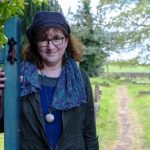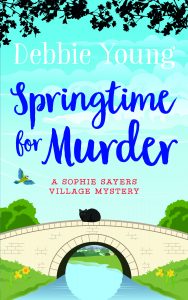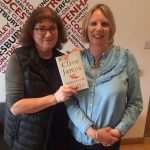22nd February 2019
Snowdrops may bristle in the garden but the evenings are still chill enough to demand a cosy fire and some cosy crime to warm you up. And reading doesn’t come much cosier and warmer than the books of author Debbie Young, this month’s An Author’s Mind contributor.

Lizzie: Welcome, Debbie!
Debbie: Thank you, Lizzie, and thank you for the opportunity to appear on An Author’s Mind.
Lizzie: An Author’s Mind provides us with insights into the fascinating writing processes of each contributor so which book would you like to talk about today?
Debbie: Springtime for Murder. This is the fifth Sophie Sayers Village Mystery, set in the Cotswold village community of Wendlebury Barrow. Bunny Carter, the elderly widow from the Manor House, is left for dead in an open grave in the village churchyard. Sophie Sayers is sure it’s a case of foul play, but when it comes to suspects, she’s spoiled for choice. One of Bunny’s squabbling children from her three different marriages? Petunia Lot, the parasitical fundraiser from the local cats’ home? Her nephew – and one of Sophie’s best friends – Billy Thompson? All had motive and opportunity. But can Sophie and her boss/boyfriend, local bookseller Hector Munro, stop her attacker before he or she strikes again? A lively array of eccentrics joins the regular cast of characters in this compelling story of family, friendship, love and loss. While the story includes plenty of wit and humour, it’s also thoughtful and poignant, reflecting Sophie’s growing wisdom, self-reliance and skill as amateur village sleuth.

Lizzie: How would you describe the genre of your book, and what drew you to this genre?
Debbie: It’s very much a cosy mystery (or cozy mystery, as Americans term it) – a gentle crime story that is family-friendly, ie nothing gory, explicitly sexual or obscene. It’s the antidote to darker crime writing such as Nordic Noir and, I hope, a force for good. Reviewers have come up with ingenious ways to describe my particular brand of cosy mystery, e.g. rose-tinted mystery and feel-good murder! I like cosy mystery because it’s upbeat, positive and thoughtful without being preachy, and has a broadly happy ending for everyone except the murderer and the victim! It’s also a norm for the genre that the victim should be someone that people have good reason to dislike (not that disliking someone gives you licence to murder them!) and the murderer is pretty unpleasant too. I’m an optimist who loves happy-ever-afters, without losing touch with reality!
Lizzie: Who is your favourite character and why?
Debbie: I love the spirited, naughty and devious old lady Bunny Carter, who tries to manipulate her family and friends to her own advantage. Her mind is razor-sharp, and although she has limited mobility due to her old age, she has an incisive mind and a passion for good books. But her situation is bittersweet, because things don’t always go according to plan – not least the death of her three husbands! Still, she’s always ready to bounce back and try again… This book marks Bunny’s first appearance in this series, and I loved getting to know her.
Lizzie: Do your characters change in your story – and it important that they do?
Debbie: Yes – they change within each novel, because the story provides them with the opportunity to learn and grow, and to my mind that makes them more believable and important. Otherwise, it would be like writing episode after episode of situation comedy, and a more superficial read. The characters present throughout the series – particularly the central characters, Sophie Sayers and love interest Hector Munro – also develop in a larger story arc, so that from start of Book 1 to the end of book 7, they will have grown considerably – and, I hope, to the satisfaction of the reader, as well as being more satisfying and interesting for me to write. Having an overall development plan as well as growth within each book has been part of my plan from the inception of the series.
Lizzie: What moments in the novel to you like best?
Debbie: Early on there is a scene in the graveyard where two local children discover the supposedly dead body of the Easter Bunny. I had great fun with one-liners and misunderstandings, but I also really enjoyed researching and writing about the gravedigger’s perspective. Their old friend Billy is the gravedigger and his knowledge and experience really enrich the scene. I was lucky enough to catch by chance a BBC Radio 4 programme called “How to be a Gravedigger” which really helped with the detail, and really boosted my admiration for the profession! I also really like the hospital scene in which Sophie and Hector go to visit Bunny and find she is up to her old tricks. I love writing very old and very young characters, and Bunny is terrific fun. Sophie and Hector’s first visit to Kitty, the addled, aging hippy daughter of Bunny, was also good fun – let’s just say her hospitality skills leave a lot to be desired! There are also a few twists and turns at the ends of chapters that I’m really proud of, which I hope will wrongfoot the reader in classic style!
Lizzie: Which moments do you like least?
Debbie: Inevitably the murder. Having settled upon featuring the word “Murder” in the titles for the whole series a couple of years ago, I quickly realised that I don’t like killing people, which I’m sure my friends and family will be glad about! I even do a talk called “The Reluctant Murderer” at literature festivals about the role of murders in mystery stories and why I’d rather have a mystery with no murder!
Lizzie: They say all fiction is autobiographical. What is the most significant event/setting for you personally in the story and why?
Debbie: The inspiration for the story was a family of children I was at school with, who shared a famous classical musician ancestor, and the same father. Between them they had three different mothers, yet they all looked very similar physically, both boys and girls, almost like clones. I didn’t know them well, but I was transfixed by them visually, and used to sit in class surreptitiously gazing at one of their number, imagining the backstory of their home-life. (I’ve also always been fascinated by identical twins – I wished I was one when I was little!) The story was also partly driven by how much I value my own family. I come from a large but close and happy family, but every family has its differences now and again, and it was a great source of sadness to us all when my mother’s brothers fell out immediately after their mother’s death, remaining at loggerheads till their father was diagnosed with terminal cancer. I have a very vivid memory of seeing them standing in the front garden, their arms around each other’s shoulders, finally reunited as they waited for the arrival of the hearse for my grandfather’s funeral, after five years of fighting when they could have been comforting each other on the loss of their mother. Bereavement does terrible things to families, and I hope that by writing about that issue, I might help other families avoid such distress.
Lizzie: What did you learn about yourself writing this novel?
Debbie: I learned that while I love making people laugh (“a laugh on every page” says one review), I am maturing as a writer and want also to address more serious themes, using my trademark comedy as comic relief. I think in each of my books there are moments when I might bring a tear to the reader’s eye, whether at a poignant romantic moment or at a heartrending confession of vulnerability by one of the characters, but I feel that I’ve reached the best and most mature balance yet in this book, which makes me very happy.
Lizzie: Where and when would you like to set another novel and why?
Debbie: The next Sophie Sayers Village Mystery will be set mainly on the idyllic Greek island of Ithaca, where Sophie goes to take part in a residential writers’ retreat, although it will be topped and tailed in her home village of Wendlebury Barrow. I particularly wanted to put Sophie to the test beyond the village where she has been quietly transforming during books 1-5 from anxious under-confident apologist to assertive and sparky independent thinker, to stretch and develop her further. There are two reasons I chose this particular setting. Firstly, because I was lucky enough to be a guest at a writers’ retreat on Ithaca a few years ago (an island I’d already visited numerous times in my sailing days and loved very much), and it was a fabulous experience – isolating, weird, and exposing, but it was at that retreat that I finally realised that I really could write a novel – and I haven’t stopped since! Secondly, I have a very, very wide circle of writer friends, and you simply couldn’t make up some of those personalities! But I shall have great fun inventing the characters in my fictional writing retreat and setting them all in conflict with each other. And pushing one of them off a cliff to their death, incriminating Sophie as number 1 suspect…
Lizzie: Could you lose yourself in this novel’s world? Why?
Debbie: Actually, I already live in a village very much like Sophie’s Wendlebury Barrow, and I never want to live anywhere else. So it bemuses me when readers sometimes take it to be a nostalgic, idealised village, harking back to a bygone age, just because the village doesn’t have Uber cabs or Deliveroo services. Sometimes reviewers say they wish they could find such a place in the modern world. I long to tell them that actually, if you just seek them out, such rural communities, where everyone is allowed to be themselves and looks out for each other, such places really do still exist. I know, I’ve lived in one for nearly thirty years! When people tell me they are glad to escape to Wendlebury in Sophie’s latest adventure, I take that as a great compliment – and hope that one day they too will find their real-life equivalent where they can live happily ever after.
Lizzie: What comes next?
Debbie: I’m currently in the finishing straits of Flat Chance, the first novel in a new series, The Staffroom at St Bride’s Mysteries, set in a traditional girls’ boarding school, where all the staff have secrets to hide – and new arrival Gemma Lamb, herself running away from a disaster in her personal life, sets out to untangle various puzzles. This is also inspired by personal experience – I worked at a famous girls’ boarding school for 13 years, so have spent many hours in the staffroom caught up in similar intrigues! Although satirical in some respects, it is a gentle, affectionate story, with the usual fiction writer’s rider that any similarity to people, places or events is entirely unintentional!
Lizzie: Thank you, Debbie, for lots of frank and in-depth answers.
Debbie: A great pleasure!
Debbie Young writes warm, witty, character-driven cosy mystery novels, filled with English humour and observational comedy. When complete, the Sophie Sayers Village Mysteries will consist of seven novels spanning the course of a village year from one summer to the next. She has also published three themed collections of short stories and had numerous stories feature in anthologies. She is founder and director of the free Hawkesbury Upton Literature Festival, now in its fifth year, and a panellist on BBC Radio Gloucestershire’s monthly Book Club slot. She runs writers’ groups in Cheltenham and Bristol and is an advisor and UK ambassador to the Alliance of Independent Authors. She is ambassador to the children’s reading charity Read for Good and also to the Type 1 diabetes charity JDRF. She has lived in a small Cotswold village for nearly half her life, serving on nearly every village committee, and celebrates community life in her writing.



If you’d like to know more about Debbie Young, her work or the Hawkesbury Upton Festival follow the social media links below:
Hawkesbury Upton Literature Festival Website
If you would like to buy Debbie’s Novels:
or her website (as above)
or any good bookshop.

